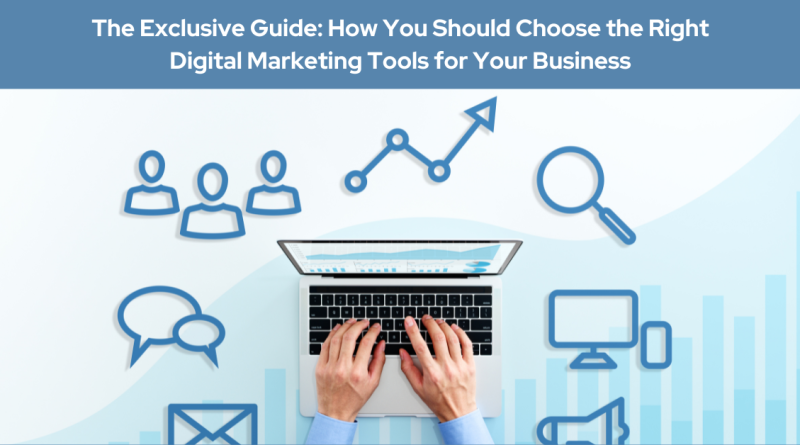The Exclusive Guide: How You Should Choose the Right Digital Marketing Tools for Your Business in 2024
In the ever-evolving world of digital marketing, selecting the right tools for your business can feel like navigating a vast ocean. With countless options available, the decision you make can significantly impact your success. Whether you’re a small business owner or a marketing professional, choosing the right digital marketing tools is crucial for achieving your goals. This guide will walk you through the process, helping you make informed decisions that will boost your online presence and drive your business forward.
Introduction: How to Choose the Right Digital Marketing Tools for Your Business in 2024
Digital marketing tools are software or platforms that help businesses manage, track, and optimize their marketing efforts. These tools can range from social media management platforms to email marketing software, SEO tools, and more. The right tools can streamline your marketing processes, provide valuable insights, and help you achieve better results.
But with so many options available, how do you choose the right ones for your business? The key is to understand your needs, evaluate your options, and make informed decisions based on your specific goals and resources.
Understanding Your Business Needs
Before diving into the world of digital marketing tools, it’s essential to understand your business needs. Different businesses have different goals, audiences, and resources. Therefore, the tools that work for one company may not be the best fit for another.
1. Define Your Goals:
Start by identifying your business’s primary marketing goals. Are you looking to increase brand awareness, generate leads, improve customer engagement, or boost sales? Knowing your goals will help you determine which tools are most relevant to your needs.
2. Know Your Audience:
Understanding your target audience is crucial in choosing the right tools. Where does your audience spend their time online? What kind of content do they consume? Knowing your audience’s preferences will help you select tools that allow you to reach them effectively.
3. Assess Your Resources:
Consider the resources you have available, including your budget, team size, and technical expertise. Some tools may require a significant investment or specialized knowledge, so it’s essential to choose tools that align with your available resources.
The Key Categories of Digital Marketing Tools in 2024
Digital marketing tools can be broadly categorized into several types, each serving a different purpose. Let’s explore these categories and some of the top tools available in each.
1. Social Media Management Tools:
Social media is a powerful platform for engaging with your audience and promoting your brand. Social media management tools help you schedule posts, monitor performance, and manage multiple accounts from one place.
– Hootsuite: A popular tool that allows you to manage all your social media accounts in one dashboard. It provides analytics, scheduling, and monitoring features.
– Buffer: Known for its simplicity, Buffer allows you to schedule posts across various social platforms and provides analytics to track performance.
– Sprout Social: A more comprehensive tool that offers social media management, engagement, and analytics features. It’s great for larger teams.
2. Email Marketing Tools:
Email marketing is one of the most effective ways to reach your audience and nurture leads. Email marketing tools help you create, send, and track email campaigns.
– Mailchimp: One of the most popular email marketing tools, Mailchimp offers a user-friendly interface, automation features, and detailed analytics.
– Constant Contact: A great option for small businesses, Constant Contact provides customizable templates, automation features, and robust analytics.
– ConvertKit: Ideal for bloggers and creators, ConvertKit focuses on simplicity and offers powerful automation features.
3. SEO Tools:
Search engine optimization (SEO) is essential for improving your website’s visibility in search engine results. SEO tools help you optimize your content, analyze keywords, and monitor your website’s performance.
– Ahrefs: A comprehensive SEO tool that offers keyword research, backlink analysis, and competitor analysis features.
– SEMrush: Known for its versatility, SEMrush provides keyword research, site audit, and competitor analysis tools.
– Moz: A user-friendly tool that offers keyword research, link building, and site audit features.
4. Content Marketing Tools:
Content marketing is all about creating and distributing valuable content to attract and engage your audience. Content marketing tools help you plan, create, and promote your content.
– BuzzSumo: A tool that helps you discover trending topics, analyze content performance, and identify influencers in your industry.
– CoSchedule: A content calendar tool that helps you plan, schedule, and promote your content across various channels.
– Canva: A design tool that makes it easy to create visually appealing graphics and presentations, even if you have no design experience.
5. Analytics Tools:
Analytics tools are essential for tracking the performance of your digital marketing efforts. They provide insights into your audience’s behavior, campaign performance, and overall ROI.
– Google Analytics: A free and powerful tool that provides detailed insights into your website’s traffic, user behavior, and conversion rates.
– Hotjar: A tool that offers heatmaps, session recordings, and surveys to help you understand how users interact with your website.
– Kissmetrics: An analytics tool that focuses on tracking individual user behavior, helping you understand the customer journey.
If you’re looking to learn Digital Marketing Courses in Thane West, Mumbai; Look no further than Digital Bizware, They are the leading digital marketing training institute in Thane. Book Your FREE DEMO Today!
Evaluating Digital Marketing Tools in 2024
Now that you have an understanding of the key categories of digital marketing tools, it’s time to evaluate your options. Here are some factors to consider when choosing the right tools for your business.
1. Ease of Use:
The tool you choose should be easy to use, especially if you or your team members are not tech-savvy. Look for tools with intuitive interfaces, clear instructions, and good customer support.
2. Features:
Evaluate the features offered by each tool. Does it have the functionality you need to achieve your goals? Consider tools that offer flexibility and scalability as your business grows.
3. Integration:
Your digital marketing tools should work seamlessly together. Look for tools that integrate with other software you use, such as your CRM, email marketing platform, or social media accounts.
4. Pricing:
Pricing is a significant factor in choosing the right tools. Compare the cost of different tools and consider whether they offer good value for the features provided. Many tools offer free trials or freemium versions, so take advantage of these to test the tool before committing.
5. Customer Support:
Good customer support is crucial, especially if you encounter issues or have questions about the tool. Look for tools that offer multiple support options, such as live chat, email, and phone support.
6. Reviews and Testimonials:
Before making a decision, read reviews and testimonials from other users. This can give you valuable insights into the tool’s strengths and weaknesses, helping you make a more informed choice.
Implementing Digital Marketing Tools in Your Strategy
Once you’ve chosen the right digital marketing tools for your business, it’s time to implement them into your strategy. Here are some tips for making the most of your tools.
1. Create a Plan:
Before diving in, create a plan for how you’ll use each tool. Define your goals, set benchmarks, and establish a timeline for implementation.
2. Train Your Team:
Ensure that your team members are trained on how to use the tools effectively. Provide resources, tutorials, and ongoing support to help them get up to speed.
3. Monitor Performance:
Regularly monitor the performance of your digital marketing efforts using your tools’ analytics features. Track key metrics, such as traffic, engagement, and conversions, to see how well your strategy is working.
4. Optimize and Adjust:
Use the insights you gain from your analytics to optimize your strategy. Make adjustments to your campaigns, content, and tools as needed to achieve better results.
The Benefits of Choosing the Right Digital Marketing Tools in 2024
Choosing the right digital marketing tools can provide numerous benefits for your business. Here are some of the key advantages:
1. Increased Efficiency:
The right tools can streamline your marketing processes, saving you time and effort. Automation features can handle repetitive tasks, allowing you to focus on more strategic activities.
2. Better Insights:
Digital marketing tools provide valuable data and insights that help you understand your audience and measure the success of your campaigns. This data-driven approach enables you to make informed decisions and optimize your strategy for better results.
3. Improved ROI:
By using the right tools, you can achieve better results with your marketing efforts, leading to a higher return on investment (ROI). Whether you’re increasing conversions, generating leads, or boosting sales, the right tools can help you get there.
4. Scalability:
As your business grows, the right digital marketing tools can scale with you. Look for tools that offer flexible pricing plans, additional features, and integrations that support your growth.
5. Competitive Advantage:
In today’s competitive market, having the right digital marketing tools can give you an edge over your competitors. By staying ahead of the curve and leveraging the latest technology, you can differentiate your brand and attract more customers.
Conclusion: Make the Right Choice When Choosing Digital Marketing Tools for Your Business
Choosing the right digital marketing tools for your business is a critical decision that can impact your success. By understanding your business needs, evaluating your options, and implementing the right tools effectively, you can achieve better results with your marketing efforts.
Remember, there’s no one-size-fits-all solution when it comes to digital marketing tools. The key is to choose tools that align with your goals, audience, and resources. With the right tools in your arsenal, you can take your digital marketing strategy to the next level and drive your business forward.
This guide has provided you with the knowledge and insights you need to make an informed decision. Now it’s time to take action. Evaluate your options, choose the right tools, and start seeing the benefits for your business today.
So, Finally if you’re the one who wants to boost the business at the highest scale possible then you should know about Digital Marketing. Learn Digital Marketing Courses in Thane at Digital Bizware & Get your dream job after the completion of your course or Scale your business online with Digital Bizware’s proven strategies.
Follow thehealthnews24.com for more informational stuff everyday.




